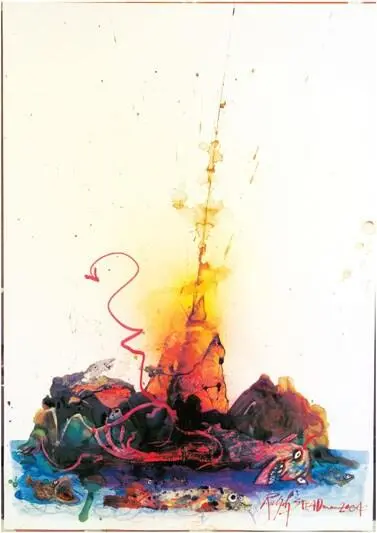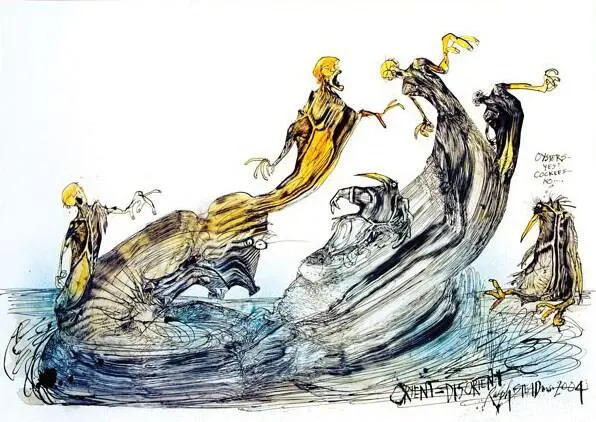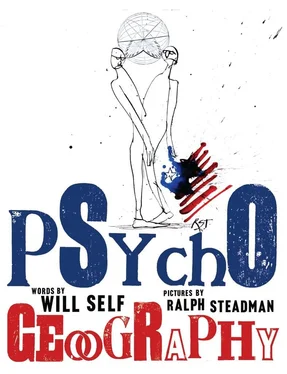
Uncle Bob may have furred up his ticker with fatty deposits but he wasn’t subdued by guerrilla surgery. Without wishing to impugn his memory, I think it fair to say that Bob remained spectacularly choleric. Aged fourteen, I was set by my uncle to clean the leaves from the gutters of the bungalow. After doing the back of the house, I moved to the front and saw him circling the poolside below, long-handled net in hand, as he fanatically removed particles of detritus from the pristine water. The inevitable mischievousness ensued: I dropped a single leaf from the roof into the pool and Bob swooped on it. I dropped a second and he swooped on this as well; a third followed and then a fourth. Finally, his hooded eyes tracked the path the leaf had followed back up to where I crouched, skinny on the eaves. With an almighty bellow of rage he smashed the pool scoop against the French windows, raced through the house, leapt into his Mini Moke and hurtled off into the hills.
But apart from these eruptions my uncle was a benign presence. The heart surgery hadn’t stopped him smoking either, and he turned a blind eye as I swiped packets of State Express 555 from the yellow and gold cartons that were scattered about the house like flammable ingots. On Radio Antilles the advert went something like this:
‘Daddy, why do you smoke State Express 555?’
‘I smoke them, son, because they’re the taste of success.’
‘Daddy, when I grow up I’m going to smoke State Express 555.’
‘You do that, son.’
With my State Express 555s well secreted I would be dropped off at the beach for a day’s snorkelling. Flipper-flapping out over the ruched seabed, imprisoned in my own portable, aquamarine diorama, I would dive down twenty and even thirty feet for sand dollars. Then I’d swim out still further and round the point until I reached the reef. Multicoloured fish would explode from its gnarled contours, while in the periphery of my vision I could see blunt-nosed barracuda, tracking the incursion of what to them must’ve been a curious white amphibian. I don’t imagine I’d be as sanguine now, but at fourteen I swam far out into the sea, revelling in the sight of manta rays the size of billiard tables, with their lethally poisonous queues-for-tails.
One day, with members of the Montserrat Walking Club, we walked up to the fumarole and stood staring into its stinky aorta. At the time it meant little to me, this fistula in the chest of Ceres, but now I wonder if Uncle Bob’s longevity — he died this year aged eighty-six — owed something to his sojourn on Montserrat? He ended his days in North Carolina, but perhaps his regular rendezvous with the volcano in the 1970s and ’80s allowed him to draw on its immense reserves of hot temper and so keep himself both alive and kicking.
The nineteen Chinese who died cockling in Morecambe Bay this February must have been hideously disorientated. The mile-wide sands, crossed by the channels of two rivers and networked with rivulets, are notoriously confusing; the tide also behaves here with fatal capriciousness, ebbing and flowing in patterns which can only be apprehended by those who’ve had years of experience. I was up on the fringes of the bay in January and even a brief walk along the sands, leaning at a forty-five-degree angle into the spume-laden gale, was enough to convince me that this was no place for anyone not powerfully motivated — desperate, even. As I plodded towards them flocks of oystercatchers lifted off into the vortical wind, where they were spun about like myriad items of tiny black and white laundry. Strange sand carts pulled by kites whipped about me, while on shore the windows of a giant old people’s home were whited out by filmy cataracts of net curtain.
But what must it have been like for the Chinese? On the far side of the world from their natal homes in Fujian province, spending short nights crammed like sardines in vans parked in the dunes, before being turfed out, in darkness, to sieve the damp sand for a mollusc they’d never heard of before. There was no justification for this, no cultural swell of atavistic jellied memory to send them in pursuit of Cockles (and Mussels) Alive, Alive O. Then they found themselves caught between advancing walls of water with no way back to dry land, and so died, choking on their own disorientation.
Rather than engage with the existential horror of their demise, the British media preferred to treat of the Chinese’s tragedy in purely economic terms. Whether classed as illegal immigrants or asylum seekers, their penury was the ostensible reason for their death, not the fact that they didn’t know where they were. So disgustingly orientated were the news agencies that they were able to despatch reporters to Fujian within hours of the tragedy, so that they could present to us highly accurate images of the forsaken place.

Those Chinese drowned in Morecambe Bay; the other Chinese suffocated in the lorry parked at the Dover ferry port; the Africans who plummet from the undercarriages of intercontinental jets as they make their approach to the developing world — am I alone in seeing all of these people as victims of extreme disorientation? Can we not go further and see that the attitudes of all Little Englander NIMBYists are merely a function of their privileged orientation? Knowing their place makes them determined to preserve it against all-comers. Or so they think, because in truth there are many among them who haven’t got a clue where they truly are. Chop down the hedge, grub out the rhododendrons, warp the way markers and steal the route map from the glove compartment of their car, then they’d be floundering as forlornly as any cockle coolie.
Frankly, I think David Blunkett 1should impose an orienteering test along with his citizenship exam; moreover, I think this should be retroactive, so that even those of us who’ve lived here all our lives should be obliged to pass, or else face expulsion. I propose this in the full knowledge that I myself might well be in severe difficulty. As I sit here, looking out over the rooftops of south London towards the giant glass Gherkin which now constitutes my most obvious point of orientation, I think I’m facing east. But I’m not 100 per cent certain of this, any more than I’m convinced of where I’m headed as I turn left out of my own front door. For most of us our social, political and economic orientation completely obscures where we are geographically. We live out our lives in cities that blot out natural features, while we resort to mechanical transport to annihilate distances and gradients. Disorientation is a luxury that only we in the affluent West can truly afford.
A fellow psychogeographer of mine — let’s call him X — has been driving his wife slowly insane for years now with a creepy mind warp. Every time he drives her to the supermarket, in order to torment her with the fact of her disorientation he takes a slightly longer route. The journey can now take anything up to an hour (it should be no more than twenty minutes), and if she has the temerity to complain he merely informs her that it’s a new shortcut. I point out to X in no uncertain terms, that, while his wife may have lost her sense of direction, he’s abandoned any sense of proportion. Both of them are now floundering in the quicksand of a failed marriage, while the treacherous tide of mortality races inexorably towards them.
The Côte d’Azur isn’t really a place at all — more a state of mind stretched out over hundreds of kilometres of beaches, headlands, outcrops, fish restaurants, walled villas and foul-tempered chiens. This sun-soaked coastline is like the strap of a bikini, suntan-oiled then teased by the imagination. My parents borrowed a house one winter at Cap d’Antibes. I was two years old and a precocious enough consumer to complain vociferously at receiving only a red plastic train for Christmas. I remember eating oysters; a palm tree growing in a courtyard; my mother collecting sea-smoothed chunks of coloured glass on the beach. She put her bounty in jars filled with water which she placed on the windowsills of the villa; the wintery sun shone through these stained-glass canisters.
Читать дальше














